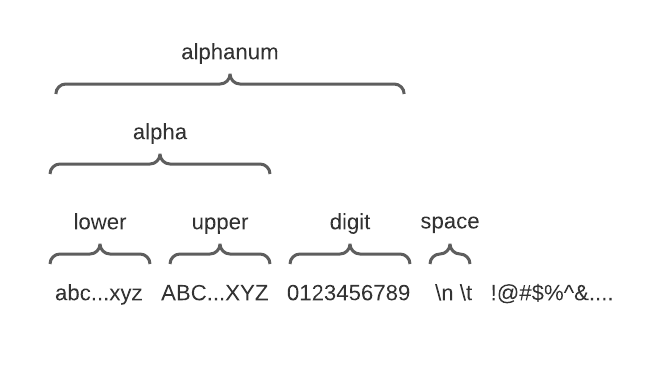To start this guide, download this zip file.
Strings
We have previously seen strings. Here we will show you quite a few more details.
A string is surrounded by single or double quotes:
name = 'Mariano'
food = "homemade lasagna is the best"You can get the length of a string with len(), the same as the length of a
list:
if __name__ == '__main__':
name = 'Mariano'
food = "homemade lasagna is the best"
print(len(name))
print(len(food))
print(f"'{name}' has {len(name)} characters and '{food}' has {len(food)} characters.")This will print:
7
28
'Mariano' has 7 characters and 'homemade lasagna is the best' has 28 characters.Concatenating strings
You can use several operations with strings. If you add strings, they are concatenated. So this:
result = 'fire' + 'place'will set result to 'fireplace'.
Often you will need to take an existing string and add on to it:
result = 'hello'
result = result + ' '
result = result + 'there'Now result references "hello there".
You can do this more easily with +=:
result = 'hello'
result += ' '
result += 'there'Accumulating a result with concatenation
Concatenation is particularly useful when you want to accumulate a result. For example:
def collect_words():
result = ''
while True:
word = input('Enter a word: ')
if word == '':
break
if result != '':
result += ' '
result += word
return result
if __name__ == '__main__':
print(collect_words())In this code we use the result variable to accumulate all of the words a
person types. We use the += to add in each word. We also use += to add a
space between the words. We use one litle trick to do this. Notice:
if result != '':
result += ' 'We don’t add the space if result is an empty string. This prevents us from
adding a space at the start of result before we have concatenated any words.
This prevents us from adding space the first time through the loop.
When you run this code, you might see:
Enter a word: Yer
Enter a word: a
Enter a word: wizard
Enter a word: Harry
Enter a word:
Yer a wizard HarryIterating over the characters in a string
You will recall that we have iterated over lists of numbers:
numbers = [1, 2, 3]
for number in numbers:
print(number)lists of strings:
names = ["Mario", "Maria", "Magda"]
for name in names:
print(name)and even lists of tuples:
players = [('John', 42), ('Emma', 33), ('Jose', 10), ('Rosaria', 18)]
for name, jersey in players:
print(f"{name} wears jersey number {jersey}")We can likewise iterate over the characters in a string:
line = 'what a life'
for character in line:
print(character)This will print out each character, including spaces, on a separate line:
w
h
a
t
a
l
i
f
eFunctions for testing strings
Following are some of the functions you can use to test strings:
islower(): returns true if all characters are lowercaseisupper(): returns true if all characters are uppercaseisalpha(): true if all characters are alphabeticisdigit(): true if all characters are digitsisalnum(): true if all characters are alphanumberic (alphabetic or digits)isspace(): true if all characters are white space (space, tab, newline)

For example:
'abc'.islower() # True
'abC'.islower() # False
'ABC'.isupper() # True
'ABc'.isupper() # False
'a'.isalpha() # True
'ab3'.isalpha() # False
'8'.isdigit() # True
'89a'.isdigit() # False
'89a'.isalnum() # True
' \t\n'.isspace() # TrueAll of these functions work on variables that reference strings, whether those strings are one or many characters long. For example:
password = 'adam123'
if password.alnum():
print('Yes')
else:
print('No')This will print Yes.
Capitalization
These functions will change capitalization:
upper(): returns a new string that is all uppercaselower: returns a new string that is all lowercase
For example:
'abc'.upper() # 'ABC'
'ABC'.lower() # 'abc'No spaces
Write a function that replaces all space characters in a string with dashes.
Work with a friend to write this code. This should take only one function. You
can find starter code in no_spaces.py.

Here is a solution:
def no_spaces(text):
result = ''
for c in text:
if c.isspace():
c = '-'
result += c
return resultWe use the accumulate pattern to build up the result string in the variable
called result. As we loop through the string, charcter by character, we change
the character to be a '-' if it is a space. We then append the character to
the result string.
Replacing numbers
Write a function that replaces every number in a string with a ?.
Work with a friend to write this code. This should take only one function. You
can find starter code in replace_numbers.py.

Here is a solution:
def no_numbers(text):
result = ''
for char in text:
if char.isdigit():
result += '?'
else:
result += char
return resultWe again use the accumulate pattern. Here instead of changing the character to
? if it is a number, we append a ?. Notice that this means we need to use
else and have two places where we accumulate into the result string.
This problem is very similar to the No spaces, and either solution could be
written in either style.
Sum digits
Write a function that sums all the digits in a string.
Work with a friend to write this code. This should take only one function. You
can find starter code in sum_digits.py.

Here is a solution:
def sum_digits(text):
"""Add all the digits found in the `text`."""
total = 0
for c in text:
if c.isdigit():
total += int(c)
return totalThis also uses the accumulate pattern. Surprise! :-) We use total to keep
track of the total. And we have to use int() to convert the character to an
integer that we can add into total.